
The FX Marcotte Furniture store stands on the site of the original store on the corner of Lincoln and Chestnut streets in Lewiston. Andree Kehn/Sun Journal
LEWISTON — The four-story building at the corner of Chestnut and Lincoln streets is a living memorial to Francois Xavier Marcotte and his life in the Twin Cities, which spanned more than half a century.
Better known to most of Lewiston and Auburn as FX Marcotte Furniture, there is a lot of history that comes with the building and a lot of business associated with it. FX Marcotte is believed to be the second-longest operating furniture store in Maine, with Stonington’s Fabulous Furniture in Brewer listing its founding as 1883. FX Marcotte was founded in 1888.
Francois Marcotte’s reputation was not just that of a successful business owner; he was a distinguished citizen, a major benefactor in the Lewiston community and a crusader for the poor, the elderly, and the working class, remaining faithful to his French-Canadian roots.
THE LEWISTON TEXTILE MILLS BECKON
The motivation behind the young French Canadian’s desire to come to Lewiston in the late 1800s from the small town of Wotton in the province of Quebec is a familiar story. He was among the thousands of French Canadians who came looking for a better life — drawn by the massive textile mills, shoe factories and brickyards in Lewiston and Auburn.

Francois Xavier Marcotte, seen in this undated photo, was a significant benefactor, donating today’s equivalent of $2 million to build the Maison Marcotte Nursing Home. Submitted photo
The Canadian economy was depressed, farming was not profitable in Quebec at the time and land prices were high. The industrial revolution was in full swing here and the mills needed a lot of workers and recruited aggressively.
The 1915 publication “Franco-Americans in Maine” put the 1910 total population of Lewiston at 26,247 — 6,660 of whom were French Canadians and 4,181 were of French Canadian parentage, for a total Franco-American population of 10,841. In contrast, Portland, with no textile mills, had a Franco American population of 726.
Francois Xavier Marcotte was just 19 when he first arrived in Lewiston around 1878. He reportedly worked for Lewiston’s Public Works Department on the municipal canals for $1 a day. He lasted one day, reportedly saying it was too much work for the money. So, he went to work in the Androscoggin Mill and then the Bates Mill for between four and six years.
Marcotte married Marie Gosselin in 1881 in Lewiston, but a few years later they returned to Canada, where they ran a general store in Saint-Georges-de-Windsor, Quebec, for a few years. One account claims he was homesick. But the couple returned to Lewiston in 1888.
MORE THAN JUST A FURNITURE STORE
Back in Maine, Francois Marcotte took a job as a clerk at Bechard Furniture. A few months later he reportedly used his life savings of $350 (the equivalent of $11,588 today) to buy the store. It was originally named Marcotte & Landry, acknowledging his first business partner. After he bought out his partner it became F.X. Marcotte until 1904, when his half-brother, G. Marcotte, became a partner and the business became F.X. Marcotte & Brother. In 1912, F.G. Gosselin was added as a partner and the name became F.X. Marcotte, Bro. & Co.
Today it is officially F.X. Marcotte Bro. & Co. Inc., but somewhere along the line it simply became FX Marcotte Furniture, with the periods dropped for marketing and ease. Despite the name, it wasn’t always about furniture.
“It started out as a general store and then got more into the furniture and appliance end of it,” current owner Michael Bonneau explained. “At the time, I guess, it was perceived to be the bigger need in the community, so he transitioned into furniture and appliances.”

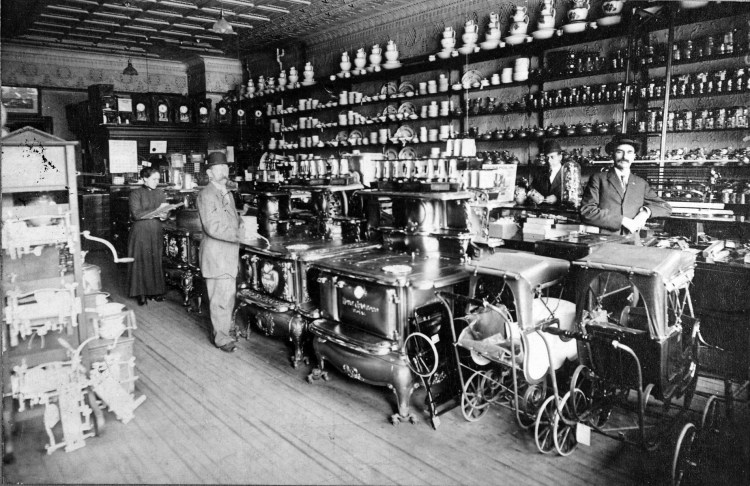
This photo shows the inside of the FX Marcotte store on Lincoln Street in Lewiston around 1910. The store sold wood stoves, baby carriages, furniture, foodstuffs and even caskets. Franco-American Collection, University of Southern Maine Libraries
Bonneau is the third generation of his family to be involved in the business and notes the location is across the street from the Dominican Block — a hub of activity in the Franco American community during those early years and home to St. Mary’s School for the French-speaking community, with the building referred to by local media as the “Canadian city hall.”
It’s also catty-corner to the Grand Trunk Railroad depot, the terminus for most of the new arrivals from Canada. “He also owned a lot of the apartment units in the area,” Bonneau said, referring to Francois Marcotte. “So, he basically would meet them at the train station, get them set up in an apartment, have them come in here, pick out stuff they needed for the apartment, that kind of thing.”

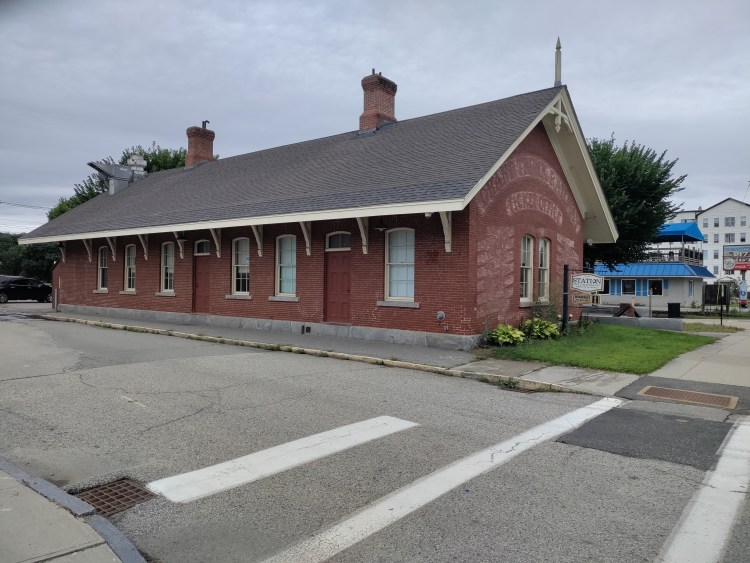
The Grand Trunk Railroad Depot on Lincoln Street in Lewiston — now a restaurant — was the terminus for all arrivals from Canada in the early 1900s. Chris Wheelock/Sun Journal

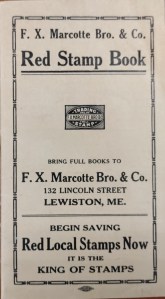
The Red Stamp Book was used by FX Marcotte. Customers could collect red stamps at other participating local businesses and redeem the stamps at the FX Marcotte store for goods. Franco-American Collection, University of Southern Maine Libraries
Six of those apartments were on the top three floors of the Marcotte building with an entrance on Chestnut Street. The stairwells and doors to the apartments still exist today, although the apartments became floorspace for the furniture store at some point.
Marcotte was well known and a contact for a lot of French Canadians already here. The mills were all around and few people had cars, making Lincoln Street busier than Lisbon Street. Marcotte would connect the new arrivals with a place to stay, a job at the mills and no-interest credit at his store — a policy that continued into the 1960s.
The ground floor of the building housed the general store, which sold just about everything, from pots and pans to wash tubs, baby trams, clocks, china, and even caskets. Marcotte ran an undertaking business on the fourth floor, selling it in 1913 to Napoleon Pinette and Reginald Fortin Sr., two young livery workers, establishing Pinette Funeral Home.
A typed copy of an obituary for Francois Xavier Marcotte mentions another part of the business. “Business booms, he opens a grocery store … his compatriots longed to hear French music, so he opened a music store, the Larose-Marcotte Music Store.”
French was still spoken regularly here in the 1960s and customers would come in and ask if they spoke French, recalls Paul Bonneau, Michael Bonneau’s uncle, who started working at FX Marcotte right out of high school and retired after working there for 52 years. While he said he didn’t speak French “as well as he should,” he said he knew enough to make the customers feel comfortable.
Marcotte was also called an “innovator” of local stamp books, which he called the Red Stamp Book. It was similar to the way S&H Green Stamps worked. Customers who made purchases at participating stores in Lewiston would receive red stamps. They could collect them until they had enough to trade in for some furniture.
Records from the early 1900s are incomplete and not all in agreement, but a July 28, 1979, story on Marcotte in the Lewiston Journal reported that in the 1930s he relinquished his shares in the business, selling them to his nephew Gerard and two employees — Arthur and Donat Bonneau, Mike Bonneau’s great-uncle and grandfather, respectively.

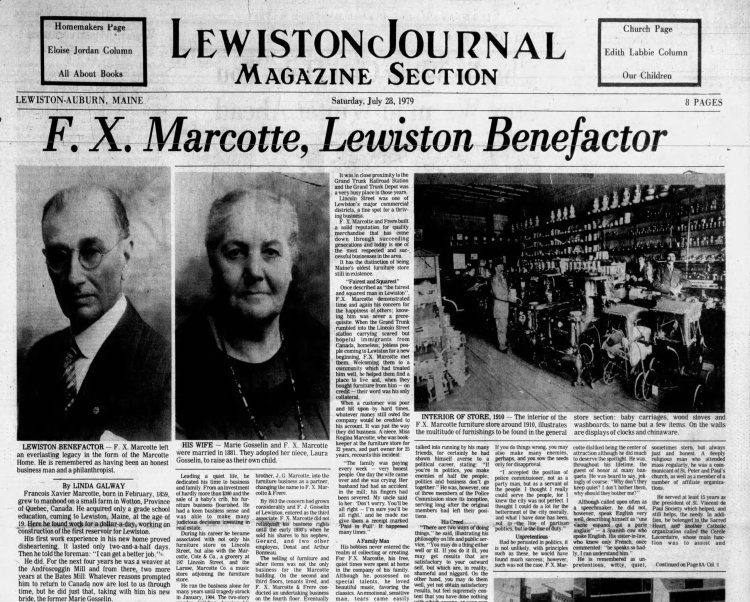
A large presentation in the Lewiston Journal Magazine Section on July 28, 1979, discussed in detail Francois Xavier Marcotte’s impact in Lewiston.
‘The Bonneau’s were a well-known business family as well, establishing the first Bonneau’s Market on Blake Street, then a larger store in the 1940s, and then the area’s first “supermarket” on Lisbon Street at South Avenue. “It’s like magic!” proclaimed the Lewiston Daily Sun of the “Master Market’s” automatic entrance doors, with features we now take for granted such as air conditioning, music and a courtesy telephone, which were all touted at the grand opening in 1954.

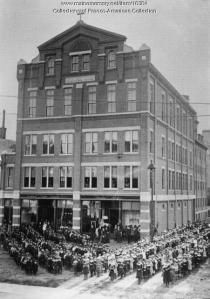
The Dominican Block at Lincoln and Chestnut streets in Lewiston was built by the local Dominican Order to house a variety of social and community services for the city’s growing French Catholic population. Paroisse Saint-Pierre et Saint-Paul
MARCOTTE THE BENEFACTOR
Francois Marcotte was once described as “the fairest and squarest man in Lewiston” and his reputation in the community was impeccable. He treated customers with respect by all accounts and was especially empathetic to the poor. He extended interest-free credit with just a handshake as collateral.
Regina Marcotte, a niece who was bookkeeper at the furniture store for 32 years and part owner for 25 years, recounted a story to the Lewiston Journal in 1979. She told the story of a customer who paid every week and came in crying one day. Her husband had an accident at one of the mills that severed his fingers.
“Don’t worry, you’ll be alright, I’m sure you’ll be alright,” Francois Marcotte is quoted as saying. He marked her account “paid in full” and gave her a receipt — something Regina Marcotte said happened many times.
Marcotte served on local boards and was said to be deeply religious and involved with the Roman Catholic Church and affiliated organizations including St. Vincent de Paul Society. Perhaps his biggest act of philanthropy was donating today’s equivalent of $2 million to the Sisters of Charity to fund the construction of Maison Marcotte, or the Marcotte Home, in 1928.
One wing was devoted to the care of the elderly with 200 beds. Another wing housed the St. Joseph’s Orphanage, home to 250 girls. Most of the girls were not orphans but children whose both parents needed to work the long shifts in the mills; it was essentially a child care with a school attached.
The number of beds varies by account, but Marcotte Home was considered the largest nonprofit nursing home in Maine, probably in New England, and one of the largest in the nation. It is today part of the St. Mary’s d’Youville Pavilion.
Within the Marcotte Home, Marcotte had an apartment built on the second floor where he and his wife lived from 1928 until their deaths. Marie Marcotte died in 1933 and Francois died in 1942, reportedly from throat cancer. Marcotte insisted on establishing a perpetual trust to care for 20 poor people from the Franco American community.

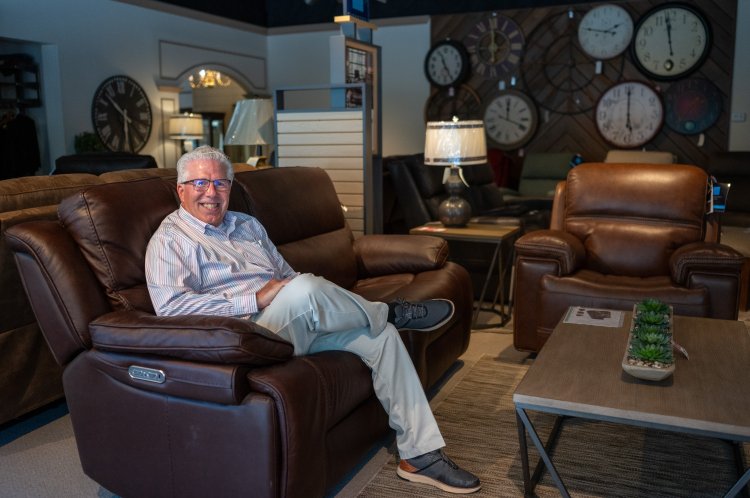
Mike Bonneau is a third-generation owner of FX Marcotte Furniture on Lincoln Street in Lewiston, which is still located on its original site. Andree Kehn/Sun Journal
A LEGACY THAT LIVES ON
Today, FX Marcotte Furniture remains a fixture in the community, focused entirely on furniture, with the original store on Lincoln Street and a second store in South Portland.
Mike Bonneau left a career in banking to join his uncle in the mid-1980s and bought him out and took over ownership in January 2013. He opened the South Portland location in 2015.

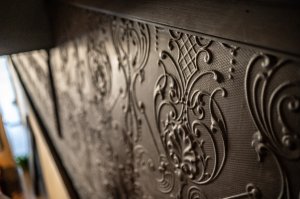
The original tin ceilings and trim can be seen inside FX Marcotte Furniture in Lewiston. Andree Kehn/Sun Journal
“At the time, it (Portland) didn’t have anything like this,” Bonneau explained. “They had a lot of lower-end guys, they had a lot of higher-end guys. But they didn’t have guys in the middle, and we were kind of the guy in the middle.”
Portland is a different market from Lewiston and Auburn, Bonneau said, so they carry the same brands of furniture but different styles and configurations. For example, he said there is a greater demand for smaller couches and tables because a lot of apartments and homes are smaller in Portland.
As for the Lewiston location, it’s not unusual to have customers come into Lincoln Street store and mention their family has shopped there for generations, and they keep coming back, said Bonneau.
“The business was basically built and is still built on the same premise,” Bonneau remarked. “You sell good quality products, you take care of your customers — they’ll take care of you. Simple as that.”
Bonneau believes there is a future for the family furniture store, which has existed in his case for 136 years. “There’s still a place for it, you know. There’s still a place for it in communities like this.”
Subtle reminders of those early days of the FX Marcotte store still exist, including the original tin ceiling and trim that can be seen in the photo of the store interior from 1910. The railroad is gone, the depot’s many arrivals are just a memory, and the halls and grounds of the Dominican Block are silent, for now. Yet, the store, its history and reputation, and Francois Xavier Marcotte’s legacy continue on.

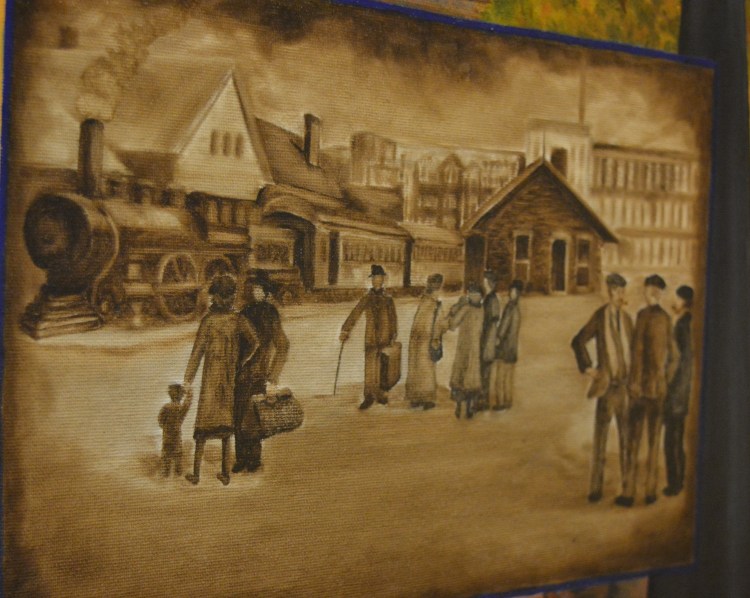
A painting by Mercedes Gastonguay of the Grand Trunk Depot depicting the arrival of people in Lewiston in the early 1900s. Franco-American Collection, University of Southern Maine Libraries
Send questions/comments to the editors.



We invite you to add your comments. We encourage a thoughtful exchange of ideas and information on this website. By joining the conversation, you are agreeing to our commenting policy and terms of use. More information is found on our FAQs. You can modify your screen name here.
Comments are managed by our staff during regular business hours Monday through Friday as well as limited hours on Saturday and Sunday. Comments held for moderation outside of those hours may take longer to approve.
Join the Conversation
Please sign into your Sun Journal account to participate in conversations below. If you do not have an account, you can register or subscribe. Questions? Please see our FAQs.